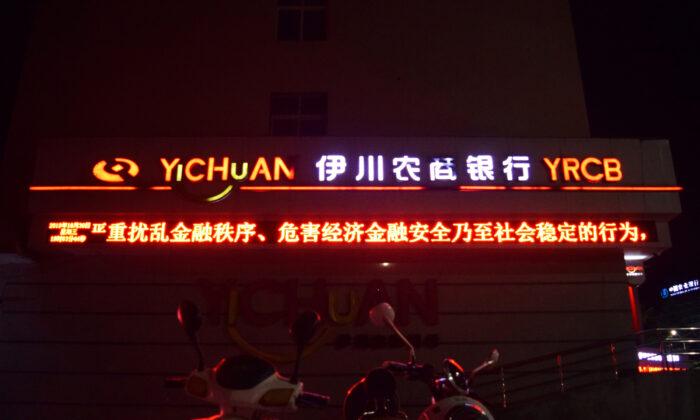BEIJING—China’s anti-corruption watchdog said on Oct. 30 it is investigating the former chairman of a rural bank for suspected corruption, and the central bank promised to take “forceful” measures to preserve financial order after depositors rushed to withdraw their savings.
Fears of poor management, risky lending practices and high levels of hidden debt at China’s thousands of small and rural banks have spurred regulators to tighten scrutiny this year. Financial strains have increased as economic growth slows to near 30-year lows.
Kang Fengli was removed from the posts of chairman and party chief at the Yichuan Rural Commercial Bank in central Henan Province this month, the Xinxiang branch of the graft watchdog said in a post on its official WeChat account.
Kang, 53, is being probed for “seriously violating discipline and the law,” it said. It did not give further details, but discipline violation is a common euphemism for corruption.
Kang is also the biggest shareholder in the bank.
Regulators are increasingly eyeing the shareholder structure of local lenders, concerned that questionable loans from the banks to their big shareholders could prove a weak point in the financial system.
Panic Among Depositors
Yichuan bank saw a high volume of customer requests to withdraw savings on Tuesday, regulators said on Wednesday.Regulators will “take forceful measures to maintain financial order and protect the legal rights of the bank and a broad number of depositors,” the local branches of the People’s Bank of China (PBOC) and the China Banking and Insurance Regulatory Commission (CBIRC) jointly said in a post on the Yichuan bank’s WeChat account.
In a notice on its WeChat account on Tuesday, Yichuan bank, which has 33 branches locally, urged people not to “believe in rumors and take out deposits blindly.”
The lender did not state the nature of the rumors.
Yichuan police said on Wednesday that they had detained a woman for spreading “false information” about a rural bank’s financial health. The police did not identify the bank.
The woman, 29, will be detained for five days for falsifying facts to disrupt public order, the police said in a post on their official WeChat account.
In its notice, Yichuan bank assured that it had sufficient assets, good business operation and management, and that the interest of all depositors was protected by law.
The bank is operating normally, and has set enough funds aside for provisions, the Luoyang branches of PBOC and CBIRC said, urging depositors to act rationally.
Deposits at the Yichuan bank are protected under the government deposit insurance program, the PBOC said in a separate notice via the Yichuan bank’s WeChat account.
Set up in February 2009, Yichuan bank has 116 shareholders and is controlled by Kang, who holds a 10.86 percent stake, according to the data from the National Enterprise Credit Information Publicity System.
By end-June, the total assets of Yichuan stood at 62.65 billion yuan ($8.87 billion), and its tier-1 capital ratio was at 9.18 percent, according to its first-half earnings report.
The bank’s bad-loan ratio was at 2.95 percent at end-2018, higher than the industry average of around 2 percent, according to a credit report of China Chengxin International Credit Rating Co (CCXI).






Friends Read Free